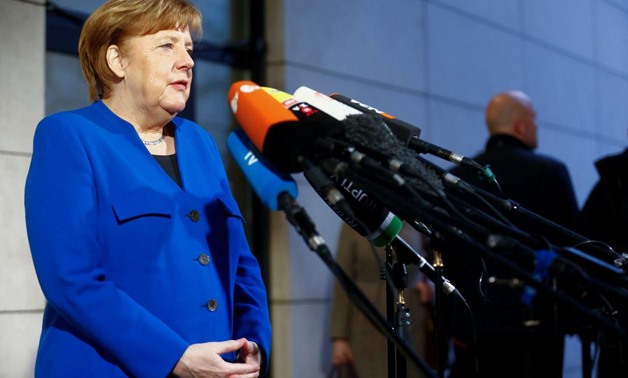
Acting German Chancellor Angela Merkel arrives for exploratory talks about forming a new coalition government at the SPD headquarters in Berlin, Germany, January 11, 2018. REUTERS/Hannibal Hanschke
BERLIN - 12 January 2018: German President Frank-Walter Steinmeier on Thursday reminded would-be coalition partners about the high stakes involved - and their responsibility for Europe - as negotiators worked through a tough final evening of talks about forming a new government.
German Chancellor Angela Merkel said her conservatives still had high hurdles to clear in Thursday's talks on whether to launch formal negotiations about a new coalition with the Social Democrats (SPD), who are pressing for accelerated integration of European Union states.
Merkel, weakened by an election setback in September, turned to the left-leaning SPD to renew the so-called "grand coalition" that ruled for two of her three previous terms, after her talks with two smaller parties collapsed in November.
Steinmeier, who is pressing both sides to reach a deal, told foreign diplomats in Berlin the delay in forming a government was unprecedented, but the German constitution provided clear rules for the situation, and everyone was taking it seriously.
"Those who bear responsibility in the institutions and parties ... know that they have this responsibility not only towards the members of their own party and their own political future. Rather, it is always also a responsibility for Europe, and for reliability, partnership and engagement in international politics," he said.
Merkel, widely respected abroad after more than 12 years in power, needs coalition talks to succeed to avoid further erosion of her personal authority and Germany's international influence, not least in the EU.
The chancellor had kicked off Thursday's talks by acknowledging it would be "a tough day" of talks on divisive issues, but said she recognised that Germans expected results. The two political blocs want to decide by Friday whether to launch formal coalition talks.
Reiner Haseloff, premier of the eastern state of Saxony-Anhalt, told reporters late on Thursday that he remained optimistic and he did not expect the talks to fail.
But another participant in the talks said the two blocs were still struggling to find common ground on the most divisive issues - taxes, pensions, migration and healthcare.
Interior Minister Thomas de Maiziere, Hesse state premier Volker Bouffier, both conservatives, and SPD deputy leader Ralf Stegner, relaxed by playing cards during a break in lower-level talks as the top tier of party leaders huddled together.
Germany's political uncertainty is at odds with its flourishing economy, whose growth hit a six-year high in 2017, helping deliver a record 38.4-billion-euro ($46.2 billion) public sector surplus.
Some argue Merkel should use the windfall to unveil a vision for Germany's future.
"What is your plan for Germany?" the mass-market Bild newspaper asked. "Fact is: the money is there for it," it added, suggesting she restructure healthcare, promote public order or outline new targets for tackling climate change.
The DIHK Chambers of Industry and Commerce suggested she use the fiscal windfall to simplify bureaucracy, while others pushed for tax cuts.
But SPD leader Martin Schulz, a former president of the European Parliament, is pursuing a very different vision, calling for the creation of a United States of Europe by 2025 - seen as an expensive distraction by many conservatives.
"On the last day of exploratory talks we will make clear that above all this must be a new start for the European Union," he told reporters. "If we join a government it will be on the condition that it makes Europe strong."
Should the parties fail to reach a deal on Thursday they could extend the talks, though Steinmeier is urging a quick deal on stable coalition to end uncertainty and avoid another vote.
Some progress has been made, including draft plans in which negotiators agreed to reduce the use of the weed killer glyphosate.
Merkel ruled with the SPD in two of her three terms in office, including in the last parliament from 2013-2017.
But both parties bled support in the Sept. 24 election, which saw the far-right Alternative for Germany (AfD) enter the Bundestag lower house of parliament for the first time.
Many SPD members fear renewing the coalition would further weaken the party, which suffered its worst result in September's vote since the modern Federal Republic was founded in 1949.
Kevin Kuehnert, head of the Jusos youth branch of the SPD, said he planned a 'NoGroKo' tour of Germany to persuade party delegates to vote against the grand coalition.
Should the two biggest party groups fail to agree on moving ahead, Merkel, albeit reluctantly, could try to form a minority government or accept new elections. ($1 = 0.8311 euros).


Comments
Leave a Comment